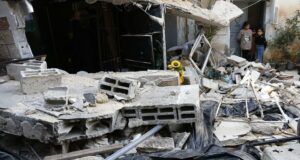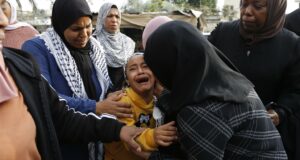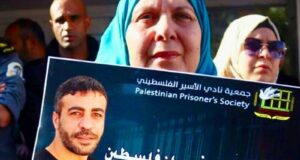Sima is a 35 year old Palestinian woman who was released approximately four months ago following two and a half years in an underground Israeli jail. She has four young children who were left without any parents during her stay in prison, as the Israeli army had assassinated her husband a little while prior to her incarceration.
On the eve of Sima’s wedding, her brother and cousin were out buying some jewelry for her as a wedding gift. The shop was quite a distance from the house so they hitched a lift with a man who was unknown to them. Soon after they set off, the Israeli army blew up the car. The driver as it turned out, was apparently connected to a militant wing of the Fatah organization. The army had been targeting the driver even though they had no confirmation of who the other two men in the car were. As a result, Sima’s husband vowed to gain justice for the incident, but was assassinated as he was coming out of a mosque.
The Israeli army then invaded Sima’s house a number of times during the night to arrest and question members of the family. They arrested one of her brothers and came back a couple of times to look for the other brother who was only 15 years old at the time. The final time they took Sima and when the family questioned the soldiers about the fate of her children, one soldier replied that there were many orphanages the children could go to.
For the first two weeks, Sima was kept in solitary confinement in a room only 2 meters by 3 meters, in complete darkness. After two weeks of this, she was connected to a polygraph machine every day for one week from 8am-5pm with electrodes attached to her fingers and forced to sit with her hands spread out and body hunched over. As a result of this, she has now developed a type of arthritis in her neck. Interrogators told her she would not be able to wash or take a shower unless she admitted to helping her husband collaborate with militants. She was beaten a number of times, and eventually she was moved to a tiny cell with five other prisoners. The food was so terrible she couldn’t eat properly for two months after being released. Sometimes there were insects all over the food but they had no choice but to eat. At one time the prisoners staged an 11-day hunger strike.
Some of the prisoners became quite ill but medical attention was slow and sporadic, especially dental treatment during which the same instruments were used in many different patients mouths without being disinfected. One of the other prisoners who was just 18 years old had a serious gum infection and was refused dental treatment which resulted in her teeth falling out.
Another time, Sima witnessed one of the prisoners who had been bitten by a scorpion and was refused medical treatment even though she was in obvious pain. Another common occurrence, Sima told us, was money for the prisoners from their relatives being stolen by soldiers. Each time the money would be collected in a tin from relatives especially if visitation rights were withdrawn which they often were on a regular basis and being emptied by the soldiers before the empty box being presented to the prisoners.
The soldiers would also spray the prisoners with cold water if they felt their spirits were too high and then spray them with tear gas. As water causes teargas to stick to the skin, this served to heighten the gas’ effects. They would also make the prisoners crouch in a line and then proceed to play “leapfrog” over them.
In the cells in winter the soldiers would bring in air conditioners and in summer they would bring in heaters as a form of torture as well as making the prisoners climb up and down stairs in their already weakened condition.
Sima was moved twice to two different underground prisons during her incarceration. Her brother is currently in an underground prison, the location of which has never been made known to her for the last 13 years. She is overjoyed to be reunited with her family however it is evident to see the trauma and scars she has had to bear. During the interview she remained relatively stable but broke down into tears on a couple of occasions. She is now trying to raise her four children and to turn her experience into something positive and recently attended the recent meeting in Shufa with Combatants for Peace.
 International Solidarity Movement Nonviolence. Justice. Freedom.
International Solidarity Movement Nonviolence. Justice. Freedom.




